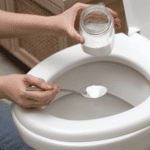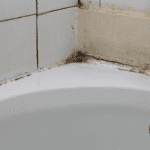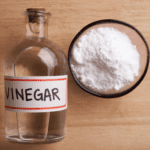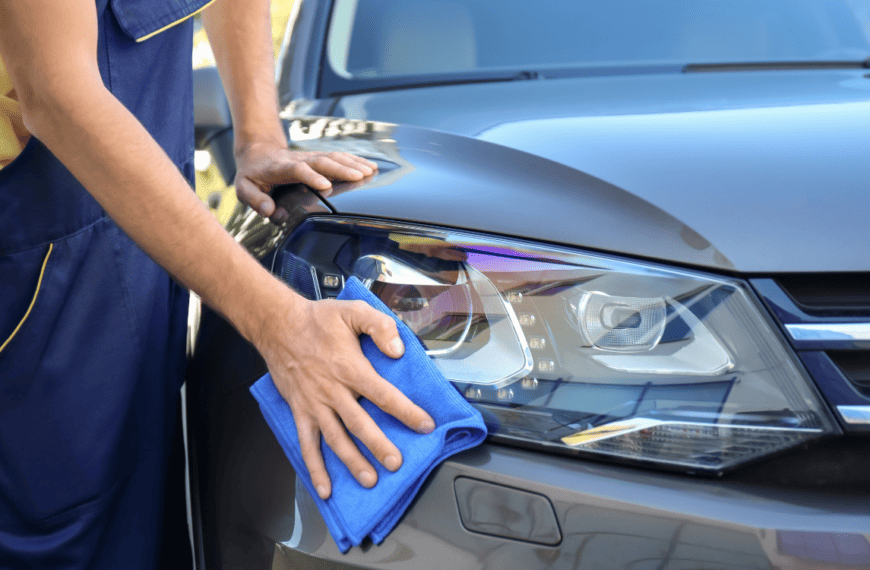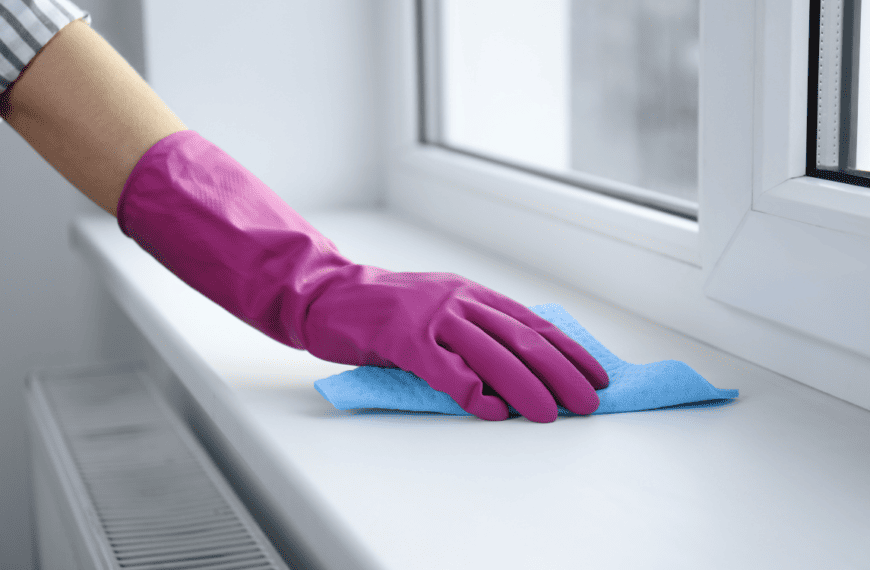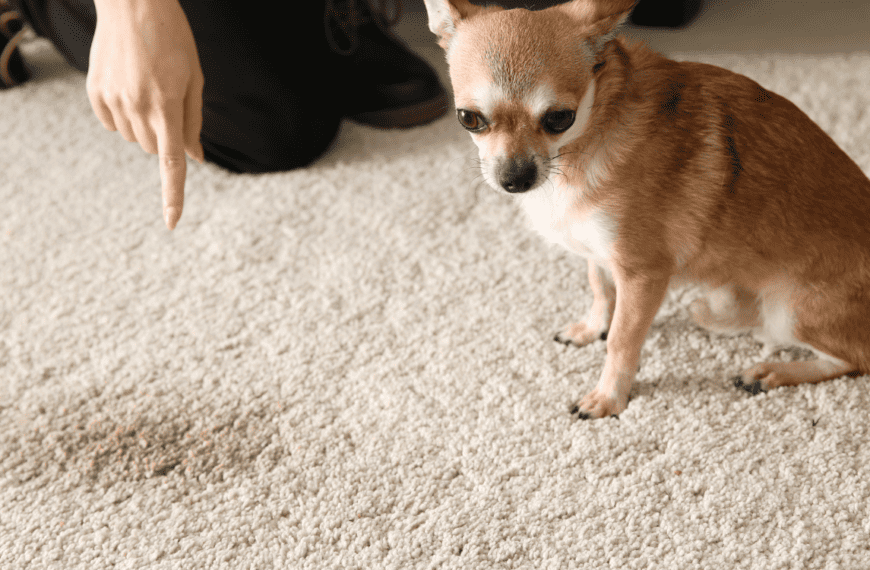A natural stone countertop is one of the most satisfying upgrades a homeowner can make anywhere in the home. The incomparable aesthetic and luxurious feel of marble counters will elevate any kitchen’s appeal. But the look does have to be flawless.
Marble countertops are eye-catching, but even more so are any tiny water stains that might appear on them. And while they’re not always difficult to remove, you could end up causing actual harm to the marble surface if you don’t use the right technique. We’ll break down a few ways to clean water stains from your marble surface without leaving even worse damage behind.
What Does a Water Stain Look Like on a Marble Countertop?
Water rings or minor liquid stains from drips can appear on any surface. If you have hard water in your area, stains can result from minerals left behind after the water evaporates. On a marble countertop, you’ll see dull spots that break up the otherwise glossy surface.
A clear mark on a marble surface isn’t always a water stain. Marble can etch in no time. As with other natural stones like limestone or granite countertops, marble will begin to dissolve when an acidic liquid sits for even a few minutes on it.
The surface layer of etched marble is worn away. You’ll notice a dull mark, which will be particularly noticeable on polished marble when you catch the light at a certain angle. The etch will take on the shape of the acidic liquid that pools on the marble.
In many cases, etching looks like a hard water stain, and you may not notice the difference until you try to clean it. If you run your hand over the spot and feel a raised bump, it’s hardened minerals from standing water on the surface.
Can You Remove Water Stains from Marble Surfaces?
If someone leaves a sweating glass on your counter, mineral deposits will appear as the water evaporates. You don’t need to polish the marble to restore it when you have hard water stains. Instead, a mild cleaner will break down the water stain to reveal the unsullied marble surface.
How Do You Remove Water Stains From Marble?
Most of the recommended marble cleaner options for hard water stains are standard features in the average household. But before you reach for your favorite homemade cleaner, you must realize that marble (and most natural stone, for that matter) is surprisingly weak against many cleaning ingredients.
Use the wrong product, and you’ll see hard-to-remove etches quickly replacing those water stains. For a safer approach to stains that won’t destroy your marble countertops, try these simple solutions for hard water marks.
1. Dish Soap
Light staining on a marble surface may require nothing more than some mild dish soap and a damp cloth. Add warm water and a drop or two of liquid soap in a spray bottle, and agitate it gently to combine. Spritz it on the water stain, or dampen a cloth or paper towel.
Wipe the stain in a circular motion until it disappears. It may take a little elbow grease to get it out, and you can try employing a soft bristle brush for light scouring power that won’t scratch the marble surface. Rinse the spot with fresh water and dry it immediately to prevent soap scum, residue, or more water spots from appearing.
A light cleaner with dish soap for your marble countertop can help with routine maintenance during your kitchen cleaning chores, especially if you have hard water. Rather than use tap water every time you need to clean, mix distilled water with soap in a spray bottle. You will always have a convenient marble countertop cleaner on hand, and you won’t have to worry about it leaving hard water deposits.
2. Steel Wool (Our Favorite Method)
You don’t want to remove stains from marble counters with anything too abrasive because the scratches will be more challenging to fix than any water spot. A soft bristle brush or plastic scraper is softer than marble, but something metal like a razor can easily dig in.
If the brush doesn’t scrub all of the build-up off the counter, try upgrading to steel wool. We recommend these steel wool soap pads. The super-fine wool is a popular finishing tool for woodwork and metal, providing a clean, polished look without the risk of damage that you would get from coarser varieties.
See how we did it:
After you wipe the stain with your dish soap and water mixture, gently rub the spot with the steel wool until the mark is gone. Rinse with water to remove any lingering residue or debris, and dry the surface thoroughly.
3. Baking Soda Poultice
To pull extra-tough water stains from marble, you may have to ditch the abrasives in favor of baking soda. A baking soda poultice consists of baking soda and a solvent, which could be water, acetone, hydrogen peroxide, or another marble-safe cleaner. For water stains, regular water will work fine.
Mix baking soda and water in a bowl to make a thick paste about the consistency of sour cream. Put the paste on the marble, and spread it around to ensure it covers the water stain completely.
Cover the area with plastic wrap, and let it sit overnight or for up to 24 hours. When the paste is dry the next day, remove the plastic wrap. Use a plastic scraper to loosen the baking soda and a damp, soft towel to wipe the area clean.
How Not to Remove Water Stains on Marble Counters
We love talking about cleaning vinegar and other natural DIY solutions, but marble is one place where acidic substances of any kind will do more harm than good. Marble is a metamorphic rock that consists primarily of calcite, a form of calcium carbonate. Other natural stones, such as limestone and travertine, are closely related to marble and have similar compositions.
When you apply acid to a stone made of calcium carbonate, it dissolves. The reaction makes for an exciting science experiment, but the irreparable damage it can cause will have you re-evaluating many of your favorite cleaners. In general, you’ll want to avoid using any of these popular substancers on your marble:
- White vinegar
- Lemon juice
- Chlorine bleach
- Ammonia
Protect your natural stone surfaces with pH-balanced cleaners, such as rubbing alcohol or 3% hydrogen peroxide. A baking soda poultice covered in plastic wrap is perhaps the most effective marble cleaner for all kinds of marks, from water spots to rust stains.
Can You Remove Etch Marks from Marble Countertops?
When you feel your hand doesn’t raise or it dips a little as you run it across the marble counter, it’s an etch, and you’ll have a much different (and more challenging) project on your hands.
Honed marble and deep etches often require professional intervention. But for light etching on a polished marble countertop, you can restore the shine with a few simple DIY tools:
- Marble polishing powder
- Water
- Microfiber cloth
Put a small amount of polishing powder on the etch marks and mist it with water until all the powder is moist. Use a soft cloth to buff the area until it’s dry. You may need to repeat the process a few times, but you’ll notice the etch mark fade with each successive treatment. Finish with a marble-safe surface cleaner and an acid-resistant impregnating sealer to prevent future staining.
How to Prevent Hard Water Stains and Etches
You can save yourself a ton of time and trouble by appreciating the damaging power of everyday items and the challenges of removing hard water stains from marble surfaces. Rather than worry about how to clean water stains from your marble countertops, follow these simple steps to prevent damage:
- Use cutting boards to keep acidic liquid like lemon or tomato juice off the counter
- Keep paper towels on hand to quickly soak standing water and other liquids
- Supply coasters for drinks
- Regularly wash your marble countertops with mild dish soap and water
- Wipe the marble down with a marble counter sealer spray once a month
Routine maintenance with a mild cleaner and soft cloth will keep stains to a minimum and make you aware of etches before they turn into expensive repair jobs. It’s crucial to know how to remove hard water stains, but they’re hardly the worst that can happen to your kitchen countertops. Pay attention to how you prepare foods and do work at your kitchen counters to ensure you’re not unwittingly exposing them to damage.
Find Cleaning Help
Marble counters bring quintessential elements of charm and luxury into the home, but they also carry extra maintenance demands. And if you’re like most people, the last thing you need is more cleaning chores.
Skip the daily stress of cleaning by hiring a local house cleaning service with Anita’s. With our hassle-free system, it’s quick and easy to find knowledgeable professionals who can give your home the care it demands. Book an expert with Anita’s today so you can focus more on enjoying your home and less on cleaning it!


